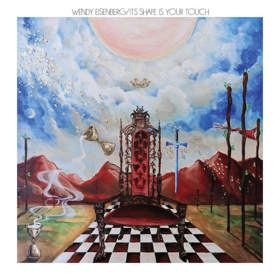Wendy Eisenberg's Double Release ITS SHAPE IS YOUR TOUCH And MACHINIC UNCONSCIOUS TRIO

|
VDSQ and Tzadik records are happy to announce the twin debut releases of Wendy Eisenberg, a peripatetic improvising guitarist. Wendy's music questions where guitar music comes from and where it is headed. Her work on both of these records evokes the genres of metal, blues, art song, jazz, noise, and the history of Brazilian guitar music, while avoiding the popular riffs that typically denote those forms. These slant references to genre and tradition are cagey and literary, challenging and emotional, and above all concerned with mood as an aesthetic practice. Both of these releases came about from chance meetings in 2014-2015. John Zorn celebrated his 60th birthday with a retrospective of his music performed by students at New England Conservatory, where she was doing her masters. Taken by her guitar playing and constant touring, a few years later Zorn commissioned The Machinic Unconscious, a trio record with Ches Smith and Trevor Dunn, named after a landmark work of critical theory by Gilles Deleuze. That work, and this trio, believes that the unconscious is never a-social or a-political, and that the liberation of such an unconscious can unleash an expansive, radical imaginative process on the poetic landscape. Eisenberg revisited some of her other favorite literary works as inspiration for the trio. The first track of The Machinic Unconscious is entitled The Descent of Alette, after the feminist poet Alice Notley's epic masterpiece. That epic is concerned with creating formal disruptions, using unique poetic phrases in constant, compulsive quotation marks as a way to control multiple simultaneous gestures. The aggressive electronic sounds that Eisenberg and Dunn use function in a similar way: concerned with arranging disembodied, insane noises in a trio's intimate form, the three musicians control and constitute the world with rebellious, unruly and, above all, different sounds. Also in 2014, Eisenberg met the incredible guitarist Sarah Louise, who introduced her to Steve Lowenthal, the impresario behind the Black Editions, Thin Wrist, and VDSQ record labels. He was most interested in her solo acoustic work, the way that her musical language was informed heavily by jazz and acoustic guitar traditions but used no explicit jazz vocabulary. In spring 2017, she went to Ted Reichman's house in Massachusetts to record a set of improvised guitar music, a meditation on loss, absence, and implication. As a coda to the record, the final track, "All Saints" was recorded at a friend's house on Halloween night, a contemplation of passing friendships and the pain of letting go. Those improvisations in total became Its Shape Is Your Touch, named after both the Richard Brautigan poem, "Here Is Something Beautiful" (etc., and William Gaddis's idea that "you can change a line without touching it". The shape of these solo improvisations is created and outlined by her unique touch on the guitar, but the lines she draws are changed by what she decides to leave out. Eisenberg's solo work is the most essential distillation of her poetic, literary approach to the musical craft. These can be read as little epigrammatic poems that presage the louder and more aggressive group improvisations on The Machinic Unconscious, and as a comment on her work within older projects A Victory for Upfish and Birthing Hips. Recognized as a guitarist conversant in everything from punk to metal to quiet songs to the heaviest improvisation, these two records intertwine brilliantly. Their simultaneous release speaks to the diversity of her talent and heralds a new challenge and tradition for the improvising guitarist. In Lowenthal's words: "Having traversed musical genres as she has, the intricate improvisations she weaves have as much to do with the vast history and musical conventions that she chooses to leave out as the sounds she chooses to play. In the process, Eisenberg introduces a vibrant, fiercely unique language all her own." |
||
Comments
Videos

